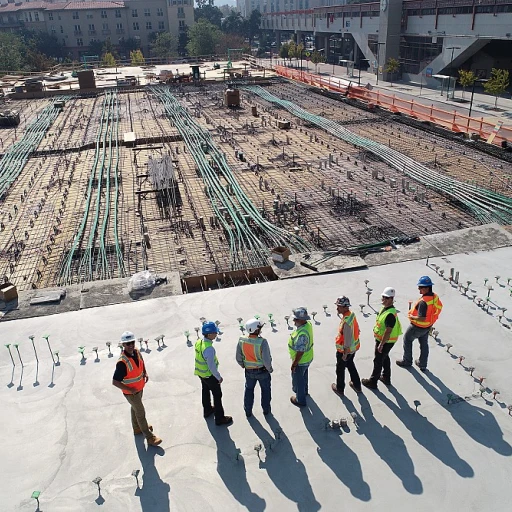
Understanding the Role of Pre-Interview Screening
Defining the Importance of Pre-Interview Screening
In the competitive landscape of recruitment, the pre-interview screening serves an essential role in identifying the most suitable candidates for a position. This initial step is a pivotal moment for both the company and the candidate, as it sets the tone for the subsequent stages in the hiring process. Essentially, the goal is to ensure a good fit between the candidate's skills, work ethic, and the company's culture. During this phase, hiring managers utilize a variety of screening methods to assess candidates' qualifications and match them with the job description. Screening interviews, which can include phone interviews or screening questions, aim to filter out candidates who may not align with the role's requirements. By doing so, the company can spend time more effectively during in-depth interviews. Moreover, with advancements in technology, the efficiency of pre-screening has been significantly enhanced. Automated systems can quickly process applications and pre-screen candidates, allowing hiring managers to focus on those with the potential to excel in the position. As the screening interview unfolds, specific interview questions are crafted to evaluate a candidate's experience and skills relevant to the job. This way, a company can identify whether a candidate will likely thrive within the organization and contribute positively to its goals. By implementing a structured pre-interview screening process, companies can effectively streamline their hiring process and attract top-tier talent. To learn more about refining your approach, consider exploring resources on revamping the background check process to enhance your recruitment strategies. Understanding the nuances and the importance of this screening process can significantly impact the overall success of acquiring suitable candidates. It's essential to remain informed about current trends and challenges to ensure a comprehensive strategy is in place."Current Trends in Background Checks
Emerging Patterns and Industry Shifts
Understanding current trends in background checks is crucial for companies striving to refine their screening processes. As technology evolves, so does the landscape of pre-employment screenings. Companies now aim to not only verify credentials and check for criminal records but also to ensure a good fit with the company culture and work environment.- Increased Use of Automation: Automation in pre-screening processes is becoming more common, allowing for faster and more efficient handling of large volumes of candidates. This includes automated phone screens and online questionnaires that help streamline initial assessments of a candidate's skills and qualifications.
- Focus on Soft Skills: There is a growing emphasis on assessing a candidate’s soft skills during the screening interview. Companies recognize that technical skills can be taught, but soft skills are often inherent and crucial for the candidate's success in the new position.
- Emphasis on Diversity and Inclusion: As organizations strive to create more diverse and inclusive work environments, there is a trend towards developing fairer screening practices. This includes reducing bias in interview pre and screening questions, ensuring equal opportunity for diverse talent pools.
- Comprehensive Social Media Checks: Companies are increasingly utilizing social media screenings to get a better sense of a candidate's character and align their online presence with the company’s core values and culture.
Challenges in Implementing Effective Screening
Overcoming Hurdles in Pre-Interview Screening
The role of pre-interview screening is crucial in the hiring process, but it comes with its own set of challenges. Companies often grapple with striking the right balance between thoroughness and efficiency. As businesses evolve, these challenges can vary based on the job, company culture, and the specific position being filled. Inadequate pre-screening can lead to hiring a candidate who is not a good fit for the role or the company culture. However, over-screening may prolong the hiring process, causing companies to miss out on top talent. The key is to find a harmonious space where you can conduct effective screening interviews without overwhelming the candidates or the hiring managers. One major hurdle is the quality of information retrieved from screenings. Sometimes, discrepancies in a candidate's work history or discrepancies in their resume may arise. These errors necessitate extra time spent reconciling conflicting data, potentially delaying the hiring decision. Thus, it's essential for hiring managers to ask screening questions that can uncover this information early in the interview process. Another limitation is the technical skill required to effectively conduct a pre screen. Not all hiring personnel are adept at handling this technology, which can lead to inconsistencies in the screening. Effective training and clear guidelines are necessary to ensure everyone involved in the interview process is on the same page, thus enabling a more streamlined experience. For companies using background checks, seamless vendor management is crucial to overcoming these challenges. Collaborative strategies and effective communication with your vendor can mitigate risks related to data inaccuracy and security concerns. To learn about effective strategies for vendor management in background checks that can help enhance your screening process, it's beneficial to adopt best practices that have been proven successful. In the competitive job market, companies cannot afford to lag behind due to inefficiencies in their pre-interview screening. Addressing these challenges effectively can facilitate smoother screening interviews, allowing effort to be focused on more promising candidates, streamlining the path to finding the ideal candidate for the job.Technological Innovations in Screening Processes
Revolutionizing Background Checks with Modern Technology
The process of background checks has evolved considerably, with technology playing a vital role. In today's fast-paced job market, companies are leveraging technological innovations to streamline pre-interview screenings, enhancing the overall hiring process. One of the key advancements is the use of artificial intelligence (AI) and machine learning algorithms. These technologies allow hiring managers to conduct more efficient candidate screenings by quickly analyzing large datasets. This helps filter out suitable applicants based on their skills and prior work experiences. Furthermore, AI-driven solutions can generate insightful interview questions that align with the job description, ensuring a consistent approach across different candidates. Automation is another critical element that has reshaped the background check landscape. The traditional time-consuming tasks of manual data entry and verification are significantly reduced with automated systems. These systems expedite the screening interview process by retrieving and cross-verifying a candidate's information against various databases. As a result, companies are not only saving valuable time but also making more informed hiring decisions. Also noteworthy is the rise of mobile-friendly platforms that facilitate on-the-go screenings. In the age of smartphones, candidates and hiring managers can engage in phone screen interviews effortlessly. This adaptability enhances the experience by offering flexibility, especially for job seekers who are already spending time navigating multiple interviews. Lastly, blockchain technology is emerging as a promising tool to ensure data integrity and transparency. With blockchain, companies can securely store and share candidate information, fostering trust between employers and potential hires. Such developments are integral when considering the legal and ethical implications evident in conducting background checks. These technological advancements not only streamline the hiring process but also ensure that candidates are a good fit for the company culture and specific positions. They equip hiring managers to focus more on in-person interviews, planning nuanced interview processes, and understanding if a candidate's answer matches the role requirements. As pre-screening tools continue to evolve, companies need to stay informed about trends to attract top talent and maintain a competitive edge in today's job market.Legal and Ethical Considerations
Balancing Legal and Ethical Standards in Background Screenings
In the process of conducting pre screening interviews, hiring managers and companies must navigate a complex landscape of legal and ethical obligations. Regulatory frameworks governing background checks aim to protect both the candidate and the employer. Understanding these guidelines is crucial to ensuring a legally compliant and ethically sound hiring process.
Employers must adhere to laws such as the Equal Employment Opportunity Commission guidelines, which prohibit discrimination against candidates based on race, gender, age, or other protected categories. The Fair Credit Reporting Act also plays a crucial role by mandating that candidates be informed of and consent to background checks, ensuring transparency throughout the screening interview process.
Moreover, privacy considerations are paramount. Ensuring the confidentiality of the candidate’s information is not just about compliance; it signifies respect for potential future employees and fosters trust. Hiring managers need to spend time understanding these regulations and implement robust data protection practices that align with both legal requirements and company culture.
Ethical considerations extend beyond mere compliance. Companies should evaluate whether their screening questions fairly assess the candidate's skills and potential for the job description, prioritizing relevance to the role rather than probing into personal history that lacks pertinence to the position. Evaluating the good fit of a candidate should not infringe on their privacy or dignity.
Lastly, it's important to be aware of the evolving nature of legislation around employment screening. Keeping abreast of changes can prevent legal pitfalls and enhance the interview pre screening process. This vigilance can also reflect positively on the company’s reputation, attracting top talent seeking to align their career with an employer who values both ethics and compliance in the hiring process.
Best Practices for Conducting Pre-Interview Screenings
Crafting an Effective Screening Strategy
In the vast landscape of pre-interview screenings, establishing best practices ensures an efficient and effective hiring process. Here's a closer look at strategies to consider:- Define Clear Objectives: Before initiating the screening process, it's pivotal to have a well-articulated understanding of the role and the skills necessary for the position. This not only helps shape the questions asked but also ensures alignment with the company culture and values.
- Tailor Screening Questions: Craft screening questions that directly relate to the job description. This helps to gauge whether the candidate is a good fit and possesses the necessary skills for the interview process. Whether through a phone interview or screening interviews, the questions should aim to clarify the candidate's experience and career trajectory.
- Implement Structured Interviews: Develop a structured interview process where every candidate is evaluated on the same criteria. This minimizes bias and ensures that every candidate is assessed fairly and consistently.
- Utilize Technology: Advances in technology offer tools that can streamline pre screening efforts. Automated screening software can efficiently parse resume data, pre screen candidates, and provide insights that can be further explored during phone interviews or person-to-person meetings.
- Engage Hiring Managers: It's essential for hiring managers to be active participants in the screening process. Their input will be invaluable in determining which candidates possess the right blend of skills and personality to match the company culture.
- Review and Iterate: After a screening interview, take time to review feedback from involved team members and the candidates themselves. This feedback will be crucial in refining interview questions and screening strategies to improve future processes.
- Ensure Legal Compliance: Stay informed of legal developments that impact screening. When hiring, compliance with local laws and industry regulations will save companies from potential legal ramifications and enhance the brand’s reputation as an ethical employer.













